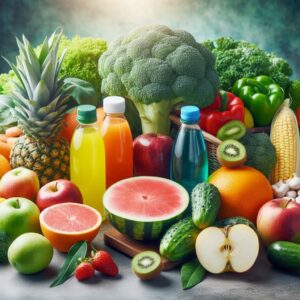The Dirty Dozen: Produce with High Pesticide Levels
Pesticides play a crucial role in modern agriculture by protecting crops from pests and diseases. However, the residues left on fruits and vegetables can pose health risks to consumers. The Environmental Working Group (EWG) annually publishes a list of produce with the highest levels of pesticide residues, helping consumers make informed choices.

- Strawberries: Often topping the list, strawberries are found to have over 99% of samples containing pesticide residues, with some having residues from multiple pesticides.
- Spinach: About 76% of spinach samples tested positive for pesticide residues, including neurotoxins like permethrin.
- Kale, Mustard, and Collard Greens: These leafy greens are often contaminated with a variety of pesticides, with kale samples showing residues of potential carcinogens.
- Grapes: More than 90% of conventionally grown grapes contain multiple pesticide residues.
- Peaches: Nearly all conventional peaches tested had detectable pesticide residues, with many containing multiple pesticides.
Why Should You Care?
Consuming produce with high levels of pesticide residues can lead to health issues such as nervous system disorders, hormonal imbalances, and even cancer. It’s especially important for vulnerable populations like children and pregnant women to minimize exposure to these chemicals.
How to Reduce Your Risk
- Buy Organic: Whenever possible, choose organic produce, which is grown without synthetic pesticides.
- Thoroughly Wash Produce: Washing fruits and vegetables under running water can help remove some pesticide residues.
- Peel When Necessary: Peeling fruits and vegetables can reduce pesticide exposure, though it also removes some nutrients.
- Diversify Your Diet: Eating a variety of produce can help minimize the risk of consuming high levels of any one pesticide.
By being mindful of the produce you buy and how you prepare it, you can reduce your exposure to harmful pesticides and enjoy a healthier diet.
I hope this fits your needs perfectly! If you need any further adjustments or additional information, just let me know. I’m here to help!